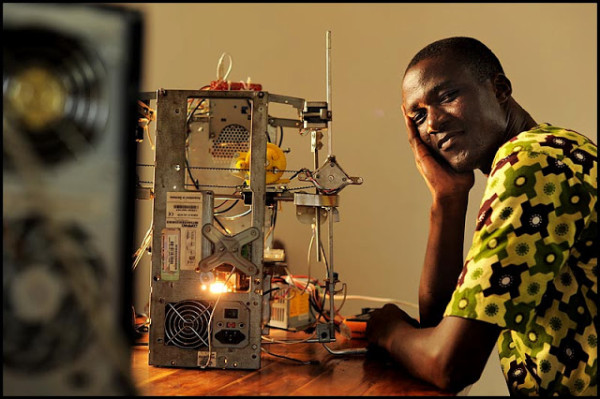WoeLab is a co-working space for “the democracy of technology”, aiming to give access to tools such as computers and materials to youth, helping them to be realise innovative ideas. Founded in 2012 by Togolese Sénamé Koffi Agbodjinou, the lab has grown from six to 15 members in one year of its launch. It is Togo's first fablab.
As part of their aim to “democratize technology”, WoeLab has created a 3D printer from electronic material retrieved from dumping sites: an environmentally-friendly printer from every point of view.
The website PA-Lunion echoes this achievement on a post [fr] from September 2013, quoting WoeLab member Edem Alomatsi:
Le Woelab est un espace ouvert, un lieu d’incubation technologique, ça rassemble les jeunes passionnés […]
Jerry c’est un ordinateur. D’abord le nom Jerry vient du mot anglais Jerrycan qui veut dire récipient ou bidon. C’est un ordinateur que nous montons en bidon comme vous le voyez, principalement avec des objets informatiques recyclés, des disques durs, des cartes mères déjà utilisées ou qui sont usagers quelque part et que les gens veulent jeter.
WoeLab is an open space, a place for technological creation gathers passionate young people together […]
Jerry is a computer. First of all, the name Jerry comes from the English word Jerrycan, that means recipient or can. It's a computer we assembled from a can, as you can see, mostly with recycled objects from computers, hard drives, used motherboards or with other things which have been used and that people discard.
W. Afate, creator of the 3D printer made out of e-waste, explained how he created the printer:
We just brought it and put it together and connected all the stuff and made it work […] We use our imagination to start from those materials and just look at old computers… and see if it’s possible.

W. Afate, creator of the 3D printer. Image courtesy of Woelab.
Rising Voices spoke with to Amadou Ndong via email, international volunteer of Francophonie at L’Africaine d’Architecture, and part of WoeLab, about their various projects.
Le WoeLab a conçue une imprimante 3D à partir de matériels électroniques récupères sur les décharges d’ordures, c’est une imprimante écologique […]
Je travaille actuellement avec des étudiants en licence de géographie à l’université de Lomé sur un projet qu’ils veulent faire : la cartographie sur OpenStreetMap et la réalisation d’un petit guide de l’université pour les étrangers et les nouveaux bacheliers et l’affichage de cartes imprimées en grands formats un peu partout dans l’université.
WoeLab came up with the idea to make a environmentally-friendly 3D printer out of discarded electronic materials[…]
I'm currently working with bachelor's students studying geography at the University of Lomé on a project they want to carry out: mapping with OpenStreetMap (OSM) and the creation of a guide of the university for new and foreign students, and printing them in large format, putting them up around the university.
As the group does many activities but lacks outside visibility, they are collaborating with the national firefighter corps of Togo to create a work flow with them around the OpenStreetMap project. We asked Amadou about how he got students involved with OpenStreetMap:
J’ai fait du volontariat sur OpenStreetMap [avant…] Je suis rentré en contact avec des etudiants de geographie et les ai proposé de leur faire la formation sur OpenStreetMap comme je le faisais au sein du WoeLab.
Mais je pense l’utilisation des GPS et des cartes que nous imprimons pour collecter des données sur le terrain les a beaucoup intéressé : ils apprennent tout cela mais c’est chaque fois en theorie seulement ils n’ont pas souvent la chance de faire la pratique et donc le projet OpenStreetMap leur permettait cela […]
J’ai formé des etudiants en Licence sur OSM et sur Qgis jusqu’a ce qu’ils puissent relaiser leur propres cartes en utilisant la donnée de OpenStreetMap.
I volunteered with OpenStreetMap [before…] I was in touch with Geography students and I proposed them to train them in OpenStreetMap, just as I did at WoeLab.
But I think it was using the GPS and the maps we printed out for data collection that really interested them: they had learnt it before but only in theory. They don't have a lot of chances to practice – the OpenStreetMap project allowed them to use these tools […]
I've trained undergraduate students on OpenStreetMap and Qgis until they were able to make their own maps using OpenStreetMap data.




5 comments
From the nascent stages of human civilization, when women worked side
by side with men everywhere, they had their children slung on a baby carrier at their backs.
For example if your nursery has a beach theme, paint a seashore scene on it or paint the stomach cast to
look like a seaside ball. They provide their kids the best of facilities and opportunities to excel in life.